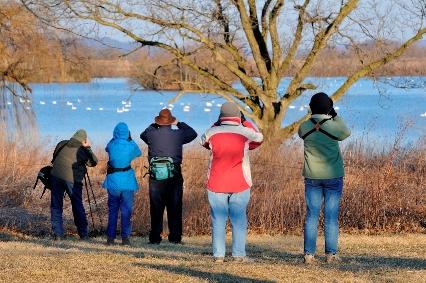Animal Viewing - Seabird Viewing

Whether as part of a specialized seabird viewing trip or as ornithological tourists dedicated to observing native or wild species, in many destinations we enjoy the opportunity to meet different types of birds. The survival of these animals depends essentially on the conservation of their ecosystem. Therefore, we must be aware and take some precautions when we decide to carry out this type of tourist activities, not only with respect to animals but also towards the environment.
Nowadays, thanks to advances in technology, we can observe animals keeping large distances. The use of binoculars and the knowledge of the features of our photographic camera allow us to enjoy bird viewing with respect.
Terrestrial bird viewing
BirdLife International –the largest NGO dedicated to birds conservation, their habitats and biodiversity– offers a series of tips to promote the well-being of birds and their ecosystems:
- Avoid disturbing birds or exposing them to some kind of danger.
- Avoid using lights, flashes, or bird songs recordings to attract their attention. These type of practices are very dangerous, especially in the breeding season. The sounds can confuse the return of the birds to their nests and even abandon their young when they are still incubating.
- Limit photographic activity, avoid using artificial lighting and flash.
- Inform the competent authorities the sighting of rare birds and consider the welfare of the species before sharing this information publicly.
- Minimize the trace of your presence by staying on existing roads and leaving no trash in your way.
- Avoid getting too close, respect the rest areas, food and demonstrations.
- Do not try to catch animals’ attention by clapping, throwing rocks, or shaking bushes.
- Do not approach nests or breeding colonies.
- Use hiding places or shelters available for the sighting activity.
- Do not use lights or flashlights to see birds.
- Do not allow birds being attracted by food. In countries like Costa Rica polled feeders are used to attract hummingbirds. However, this practice keeps birds away from flowers that would naturally pollinate and therefore it alters natural systems, reduces pollination (essential to maintain biodiversity) and limits the variety of pollinated plant species.
- Try to be quiet, especially in nursery areas. Birds protect eggs from heat or cold, if they feel threatened and abandon them – even temporarily- they might be overexposed or can accidentally crush them.
- In case of going with dogs, always keep them on a leash.
The Royal Society for the Protection of Birds (RSPB) reminds us of the importance that “the birds’ interest” comes first and encourages us to learn about the laws and regulations of the destination.
Although they allow us to get closer and interact with the birds, avoid participating in shows with parrots, raptors or other birds, as well as the use of this animals for photographs. There activities have serious consequences for their well-being.
Seabird viewing
In the case of seabirds, the disorder caused by the traffic of the boats cause great transformations in their ecosystem and impoverishes their habitats through chemical and noise pollution. If we add the increasing interest in this kind of activity, consequences are that the approach of boats on birds have an impactful impoverishment in their search for food.
We can find spectacular concentrations of seabirds, whether they are feeding on the surface, diving, or simply resting and bathing. Most of these concentrations respond to migratory trips od hundreds or thousands of kilometres due to reproductive reasons, breeding or food availability. In order to observe the nature of these birds at such a critical moment, our trips must always meet the following requirements:
- Be aware of birds in the water, slow down and / or alter course to avoid collision.
- Stay on the fringes of these concentrations. Ships should stay 100 meters away and small boats or Zodiacs 30 meters away.
- Birds such as penguins may be subject to disturbance by Zodiac operations close to landing sites or colonies.
- Approach or depart a landing site or colony slowly to minimize any disturbance.
- Avoid boat operations in waters close to where birds enter, exit, bath, or feed.
- Staff/crew should assess the best landing point. Ideally as far from the birds as possible. This is particularly important if birds are moulting near the shore.
- There may be occasions when swimming penguins find themselves in a Zodiac. In that case occupants should remain quiet and wait for the penguin to find its own way out. Usually is not necessary to assist.
- Under no circumstances birds should be fed.
